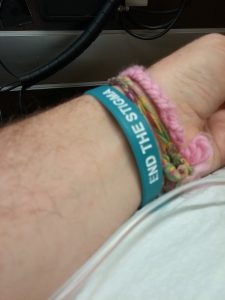Staring at my budget with blurred eyes and a brain addled by a host of fun chemicals, I have to pinch myself and remind myself there are reasons that I chose the long game; there are reasons I passed over GoFundMe or GiveForward or any of the other single-goal fundraising websites my friends have used wisely to bridge specific financial gaps. I’ve seen those sites work super effectively, raising $3,000 or more in less than a week while targeting figures high enough to cover a host of potential costs ahead. For those friends, who would be “out of the woods” in a few months or so, where all their resources will be expended in a concentrated time, I think the outreach and the community reciprocity is amazing and a great testament to compassion within our social groups. But I’m not hard-wired that way, and my condition is not so neatly tied up in a closed time-frame.
Longer stretch, earning smaller frequent support goals
 At this point, though it could change, I am on this merry-go-round every three weeks until I die — preferably quite a few years from now. And while I am still riding my chosen horse (a big, jet-black unicorn with a dangerously sharp silver horn, if you must know), I have a lot that I want to accomplish. I can’t manage a job for more than an hour or two most mornings, so I haven’t been traditionally employed for over two years. And yet, I have so much work to do! Like my book on living well with advanced cancer, getting on with life in spite of new limitations and finding the very best of ourselves along theway. Continue reading Support My Site in September and get My Book Free!
At this point, though it could change, I am on this merry-go-round every three weeks until I die — preferably quite a few years from now. And while I am still riding my chosen horse (a big, jet-black unicorn with a dangerously sharp silver horn, if you must know), I have a lot that I want to accomplish. I can’t manage a job for more than an hour or two most mornings, so I haven’t been traditionally employed for over two years. And yet, I have so much work to do! Like my book on living well with advanced cancer, getting on with life in spite of new limitations and finding the very best of ourselves along theway. Continue reading Support My Site in September and get My Book Free!


